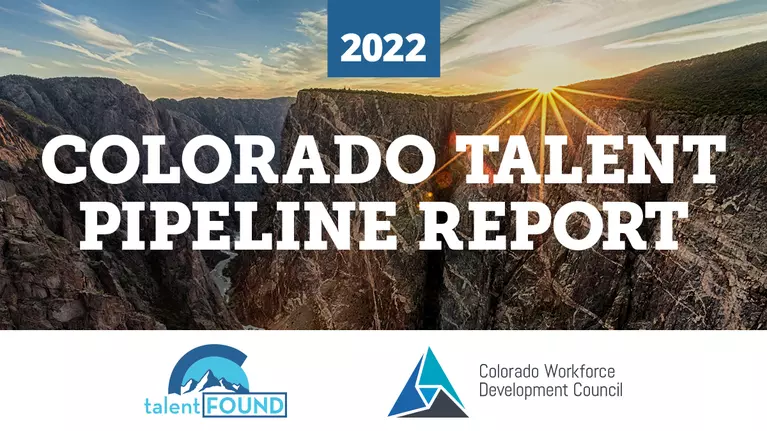Strengthening the Workforce: Colorado Talent Pipeline Report

The Talent Pipeline Report analyzes and explains labor market information, highlights talent development strategies, and provides data-informed opportunities to enhance the talent pipeline in Colorado.
The Talent Pipeline Report provides data and strategies to inform the development of legislation and policies as well as the implementation of existing work. The data show that Colorado’s workforce continues to be a strength. Opportunities exist now for Coloradans to move into good jobs, and our continued focus on the talent pipeline will ensure that equity is increased statewide and that Colorado works for all.
Additional progress was made through the passage of bills in the 2022 Legislative Session to enhance the connections between our state’s education and workforce system. Bold ideas are being developed by local and state experts that can modernize our approaches to skill development and ensure those efforts are responsive to the needs of industry.
Opportunities moving forward build upon previous legislation, policies, and programs. These approaches are levers in our continued work to enhance our talent development system to meet the needs of businesses, job seekers, workers, and learners to support a Colorado for all.
Enhance opportunities for employers to promote job quality and connect with historically excluded talent to expand access to skilled talent and connect Coloradans with quality jobs.
- Incorporate quality metrics and equity impact assessments into procurement processes for publicly-funded projects.
- Focus programming on and increase availability of resources to underutilized talent pools, such as opportunities for postsecondary credentials, work-based learning, and subsidized employment. Populations to support include justice-involved individuals, New Americans, people of color, rural communities, individuals with disabilities, and older workers.
Strengthen the state’s data infrastructure to better identify longitudinal outcomes of policies and programs, which will help inform decision makers about evidence-based practices and effective methods to close equity gaps.
- Connected data across the postsecondary and workforce landscape are vital to the calculation of new measures of success. Develop a statewide longitudinal data system that allows for more disaggregated data between different kinds of postsecondary credentials.
- As these recommendations around measures of postsecondary and workforce success continue to be developed, work to ensure that 1) data are shared in well-governed, responsible ways across state agencies building on successful efforts such as the Linked Information Network of Colorado (LINC) and the Colorado Data Trust, 2) work is building on already existing data infrastructure, such as that developed in relation to adult education, and 3) the recommendations from HB21-1330 and HB22-1349 are implemented.
Continue current efforts to develop an ecosystem to empower learners/earners to have agency and ownership of their data on their education and employment journeys through digital learner and employment records.
- Build upon existing offerings supported by state agencies, such as myColorado and My Colorado Journey. The data in this ecosystem are owned by the learner and validated by various stakeholders across education, training, workforce, and industry to demonstrate proof of learning and skills development over the course of an individual’s education and career.
Strengthen critical industries so all businesses can thrive.
- Fund sector-specific initiatives to develop regional solutions for talent shortages that will create sustainable solutions beyond stimulus funding.
- Update, align, and promote existing strategic statewide talent plans for education, early childhood education, and direct-care sectors and develop plans for new areas such as infrastructure and homebuilding.
Increase the availability of connected learning opportunities to smooth the transition from secondary
education to the workforce.
- Implement the recommendations of the HB22-1215 Task Force to create a statewide, comprehensive system for secondary education, postsecondary education, and work-based learning.
- Support the continuation of apprenticeship efforts, including CO-HELPS and CO-TECH.
- Develop funding mechanisms to support the development and continuation of a work-based learning ecosystem that allows employers and partners to communicate effectively at the local level, including continuation of the stimulus-funded Rural Coaction Grants.


